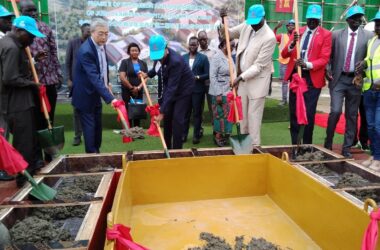By Nakwam Rose
South Sudan joined the global community in celebrating International Midwife’s Day under the theme “Midwives: Critical in Every Crisis.”
Despite the country’s instability, South Sudan took the opportunity to honor the vital healthcare professionals and appreciate their significant contributions to the health sector.
In a country grappling with inadequate healthcare facilities, midwives serve as a turning point, crucial in ensuring safe deliveries and saving lives regardless of challenging circumstances.
Dr. Anin Ngot Mou, Undersecretary at the Ministry of Health, lauded midwives as “critical anchors” who heroically step up during crises.
“Midwives in South Sudan are not just responders; they are critical anchors before, during and after crises,” stated Dr. Anin.
The dedication of midwives is exemplified by individuals like Mary Sadia, who works in an internally displaced persons (IDP) camp in Juba.
Mary’s story is a testament to the difficulties midwives navigate to provide essential services, offering help, hope, and a chance at a new life for displaced mothers.
Midwives like Mary consistently go above and beyond to save lives. “Stories like Mary’s are echoed across the country where midwives serve in camps, transit centers, and host communities, often stepping beyond clinical care to offer psychosocial support, health education, and advocacy.”
A 2023 assessment by the United Nations Population Fund (UNFPA) revealed the wide range of medical areas midwives cover, including obstetric care, reproductive health coordination, and crisis response planning.
The assessment also listed obstacles hindering their work, such as a shortage of essential supplies. Despite these challenges, midwives have played a crucial role in overcoming impediments to their service.
“Despite these challenges, many midwives have demonstrated remarkable resilience, gaining leadership and technical skills through humanitarian work,” the statement added. “Advances in virtual training, introduced during the COVID-19 pandemic, have further expanded their capabilities.”
Advocates emphasized the need to protect midwives at all costs and provide them with a platform to voice their opinions.
Achieving this requires updating training curricula to include emergency response skills, improving working conditions, and fostering stronger partnerships across sectors.
The statement underscored that investing in midwives is not optional but essential, deserving of praise for their unwavering commitment and courage. They have persevered through significant difficulties to provide exceptional services.
“Investing in midwives is not optional, it is essential. They have met every crisis with courage. Now it is time the world responds with commitment,” the statement read.
With South Sudan continuing to record one of the world’s highest maternal mortality rates, compounded by limited access to skilled birth attendants and widespread humanitarian need, midwives have become the backbone of maternal and newborn healthcare, delivering essential services even in the most challenging circumstances.
The urgent need for action is further highlighted by the fact that “With 2.4 million women of reproductive age among the 9.3 million people in need of humanitarian assistance in South Sudan, the call to action is now.”




